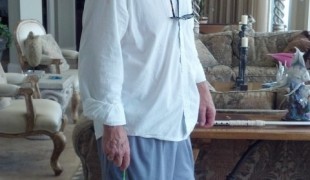- 11704
- 769
- 33
- 34
- 1
- Help Ukraine
About the solution
This low-cost wearable technology, called Object Detection Instrument (ODI) works by being placed on a person’s body, and it detects any obstacle within a metre. It is connected to a mobile app, via Bluetooth, and so it alerts the user through vibrations and voice alerts.
“I know how much my grandfater suffered. So I decided to do something for the visually impaired, the student explained.
It took Vishweswar two months to develop the product, and he created it in his bedroom. When it was finished, the inventor tested the ODI. “I tested it at a special needs school in Dubai. A couple of students tried it on and gave me constructive feedback. They suggested some additional features. One of them suggested I resize the device to make it lighter and smaller”, the teenager added.
The device has a production cost of about 80 USD, and Vishweswar hopes do commercialize it worldwide.
The inventor won the first award at GEMS Modern Academy, having received approximately 2,700 USD. He will also receive guidance to convert his idea for a wearable object detection device into a business start-up.
Adapted from: http://bit.ly/1THp6Ml
What about you, do you have any solutions? Please share them with the Patient Innovation community!
https://youtu.be/Nhepx-0phos
这些解决方案不应包括使用药物,化学品或生物制品(包括食品);创伤性设备;冒犯性的,商业或内在危险的内容。该解决方案未经医学验证。请谨慎进行!如果您有任何疑问,请咨询健康专家。
DISCLAIMER: This story was written by someone who is not the author of the solution, therefore please be advised that, although it was written with the utmost respect for the innovation and the innovator, there can be some incorrect statements. If you find any errors please contact the patient Innovation team via info@patient-innovation.com
-
-
498
-
0
-
6961

Student invents device to help his visually impaired family members
-
-
-
348
-
0
-
4272

Collaborator Pierluigi Mantovani creates Evolution Devices - solutions that aim to transform Multiple Sclerosis Management
CAREGIVING
BODY BALANCE: Maintaining body balance
STANDING UP: Standing up from a seated position
WALKING: Walking
Multiple Sclerosis
Assistive Daily Life Device (to help ADL)
Walking Aid (wheelchair/walker/crutches)
App (Including when connected with wearable)
AI algorithm
Body-Worn solutions (Clothing, accessories, shoes, sensors...)
Restoring mobility
Regaining sensory function
Managing pain
Promoting self-management
Preserving Organ Function
Managing Neurological Disorders
Maintaining Balance and Mobility
To improve Treatment/Therapy
Preventing (Vaccination, Protection, Falls, Research/Mapping)
Raise awareness
Caregiving Support
General and Family Medicine
Internal Medicine
Medical Genetics
Neurology
Physical Medicine and Rehabilitation
United States
-
-
-
710
-
0
-
10485

Assistive walking device
WALKING: Walking
WALKING WITH A WALKING AID: Walking with a walking aid
BODY BALANCE: Maintaining body balance
Body-Worn solutions (Clothing, accessories, shoes, sensors...)
App (Including when connected with wearable)
Assistive Daily Life Device (to help ADL)
Walking Aid (wheelchair/walker/crutches)
Loss of balance
Frequent falls
Restoring mobility
Regaining sensory function
Managing Neurological Disorders
Recovering from Traumatic Injuries
Maintaining Balance and Mobility
Preventing (Vaccination, Protection, Falls, Research/Mapping)
Neurology
Physical Medicine and Rehabilitation
Mobility issues
Solutions for Disabled people
United States
-
 zh
zh
Subhan • Mon, 08/19/2019 - 15:04